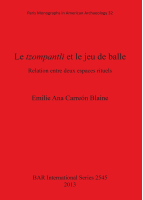Description
BOOK DESCRIPTIONWestern values imposed on pre-Columbian practices are obstacles in the understanding of the relationship between the 'skull-rack' (tzompantli) and the 'ball-court'. The impact of a long-held interpretation which stems from the belief that in the ball-game the loser was beheaded is probed, once the activities related to both sacred spaces are surveyed, to examine the genesis of an unfounded proposal. The research shows it is the product of the reminiscence, particular to each epoch, that views the pre-Columbian world from its own conception of rituals and images, those related to games and sports; cannibalism and punishment.











